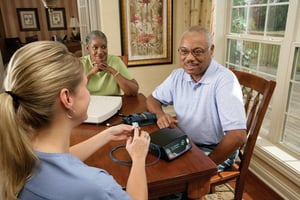Managing chronic disease has never been easy for physicians – not only because of the complexities...
CHF and COPD in the Summer: 4 Tips for Home Care Givers
Northeast Ohio summers can be tough for people who struggle to breath.
High humidity, pollen and dramatic changes in the weather can aggravate chronic illnesses, particularly Chronic Obstructive Pulmonary Disease (COPD) and Congestive Heart Failure (CHF).
Registered Nurse Monyett Freeman, medical/surgical clinical manager for Visiting Nurse Association of Ohio, said people affected by COPD and CHF should take special care during hot weather months to alleviate respiratory distress. She offered the following checklist for home care givers and patients:
- Take frequent rests.
Take breaks often – even during light activity, like housework or walking – and drink plenty of water. Avoid exertive activity altogether during periods of extreme hot weather.
- Use breathing techniques.
When breathing becomes labored, sit down and breathe deeply in through the nose and out through the mouth. This breathing technique slows the breathing and can help improve anxiousness. VNA of Ohio’s homecare professionals work with COPD patients and their families to teach other breathing techniques, including pursed-lips breathing and diaphragmatic (or, abdominal/belly) breathing.
- Test your oxygen levels.
Using a pulse oximeter (a small sensor placed on a fingertip that monitors oxygen saturation), patients can test their oxygen levels at home throughout the day. Freeman said patients should have an oxygen saturation of between 90 and 100. If this number drops below 90 several times during the day, supplementary oxygen may be needed.
The information provided by a pulse oximeter also can be a calming antidote to the panicky feeling that can come with respiratory distress.
“Sometimes, when patients feel short of breath, they also get anxious, and that can make it worse,” Freeman said. “When they see that number, they can say, ‘Ok, my oxygen is good. I just need to calm down.’ It might give them some reassurance that they are not as (unwell) as they thought they were.”
- Keep as cool as possible.
Use air conditioners, fans and dehumidifiers to control the climate in your home. The federal Home Energy Assistance Program’s Summer Crisis Program offers assistance to low-income individuals who are elderly or have been diagnosed with chronic medical conditions, like COPD or CHF. The one-time grants can be used to pay high summer electric bills or to purchase fans or air conditioners.
Dehumidifiers also are helpful to reduce the moisture in the air, which can make breathing more difficult. While most everyone finds comfort in air conditioning on a hot day, opinions tend to differ about whether fans are helpful or harmful.
“Some patients like the air moving around in the home, others say it takes their breath,” Freeman said. “We suggest they try different ways to find what helps them have optimal breathing.”
If climate control isn’t an option, find other ways to cool down. Take cool showers or baths, and place cold packs or washcloths on pulse points, including the neck, under the arm and the groin.
Call VNA of Ohio Today
Learn more about VNA of Ohio home healthcare services, or call us today at 1-877-698-6264.



